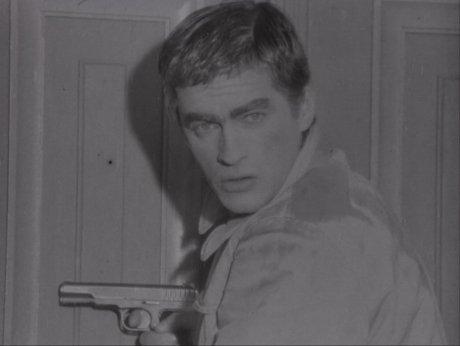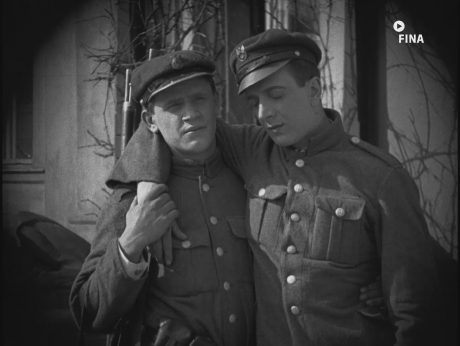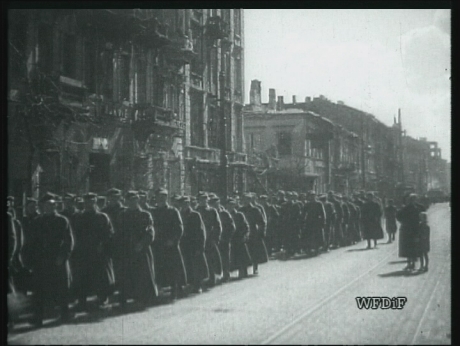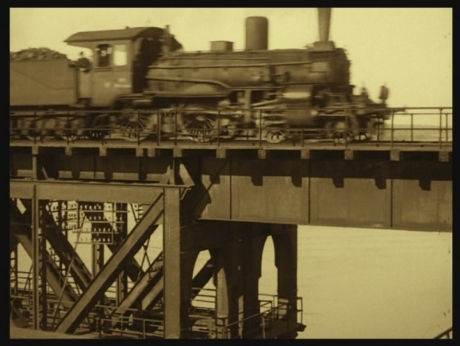
 overview
overview
A newly married couple desperately tries to find a flat only for themselves. When they finally find a beautiful room it turns out that despite what the owner had said, they must share it with some eccentric neighbours. One day two men who claim to be inspectors visit their flat. They are in reality liars who are looking for a treasure hidden in the walls of the room…

 storyline
storyline
Warsaw, the 40ties. In the centre of town a group of builders dig, build, renovate. Among the brave people from SP (Work duty) an elegantly dressed man walks around nervously. He asks for the way to Nowy Świat. He is in a hurry to his own wedding. His fiancé is waiting at the registry office and is starting to lose hope that her future husband will even arrive. When he finally runs into the room she does everything to show him how insulted she feels. However the wedding takes place. Kryśka and Witek put on the rings. At the wedding party everyone is having fun apart from the bride who is extremely angry at her husband. When she finds out the reason for his being late she mellows. The young couple loses its chance for their own room and Witek tries to find a place where they can spend their wedding night. He doesn’t find one. They will spend the night like they used to: the bride with a few friends in one room, the groom in a crowded flat in which several dozen people are staying. The next day – at work – they both continue looking for a room. Witek is the driver of a city bus and hears the conversation of two passengers who say that among the ruins on Równa 64 there is an attractive place to stay. Witek goes there and sees that the room is indeed impressive. He pays Malikowa, the owner, an advance payment and runs off to get Kryśka. He draws the plan of the room on a piece of paper and marks the place where his wife will be sleeping with a pencil. He signs it “treasure” – that is what he usually calls her, his treasure. In the evening it turns out that they are not the only occupants in the room. The following people arrive: a complaining lawyer, the young niece of the owner, a shy worker of a gas plant, and a funny sound imitator from the radio, who organized a rehearsal: he practices dog barks and bird songs. Kryśka gets an attack of anger. He runs outside into the ruins. Witek’s explanations that he did not know about the other occupants don’t help. They stand on one of the ruined balconies on the floor and look at the panorama of the capital. They dream about their own flat which will be built soon. They go back to Malikowa where everyone is sleeping in a huge crowd. The next day the two men that Witek overheard in the bus appear. They claim to be inspectors and say that Malikowa and her occupants must move out. However in reality they are liars, who want to find a treasure allegedly hidden in one of the walls in Milakowa’s flat. However the occupants quickly realise this, because one of them overhears the men’s conversation. Everyone starts a crazy search. Emotions are wild when someone finds the piece of paper Witek wrote on with the word “treasure” on the floor. Everybody makes holes in the walls with anything they can. The walls collapse, the whole building begins to break down and everyone inside is trapped. They are freed after several dozen hours by workers who are drilling a tunnel on the W-Z route. Soon Kryśka and Witek get their dream flat.

 comment
comment

 press review
press review
“The film begins with a comic situation: a disoriented bus driver looking for a flat asked the workers of the SP (Work duty) where Krakowskie Przedmieście is. The first one answers in Czech, the second is Romanian, the third is Polish, but he comes from the countryside and doesn’t know where Krakowskie Przedmieście is. The subject of “Treasure” is very up to date. Warsaw is ruined and there is a housing problem, however there is a certain medicine to this illness in both life and film – the numerous new cooperative homes. That is why we can laugh and laugh at this comedy. We are happy to see a lack of the pre-war »humour« – stupid and empty, thoughtless and senseless. »Treasure« teaches us to look at serious life problems with a sense of humour, therefore this comedy wants to both entertain and teach, wants to conquer problems with humour, and this aim is a success. This is the first attempt to create a new type of meaningful Polish comedy and this attempt is – let’s say this straight away – a success. The first half of »Treasure« is significantly different from the worse second part. In the first half the film has a good tempo, many changes, amusing dialogs and situational comedy. The scenes in the crowded flat are very good, the episode in the studio in which the lector who is in love makes a meowing sound instead of a child’s cry in front of the microphone, is excellent. However the second part is lengthy. Looking for the treasure, which is supposed to be the heart of the film and the scene in the crowded flat are too long and not very amusing. Especially the episode in the crowded flat is off the mark and doesn’t have the character of a comedy. The tempo of the action in this part of the film slows down, while it is at the end of a comedy that it should be at its best. Technically »Treasure« is at a high level – good pictures, good decorations (the mock-up of Warsaw) and clear sound”.
Bohdan Węsierski, Skarb, „Razem”, 1949, nr 9
“»Treasure« is the starting point of the light repertoire of our film production, it is in a way a representation ticket, an experimental balloon in a sense. We must fix any small defects on it which could turn into huge mistakes in our future work. That is why the criticism of »Treasure« must be harsh, maybe even too harsh. Let’s start with the advantages, as there are quite a few of them. The first one is the action which is placed in the rebuilding capital, it is in unison with the rhythm of Warsaw’s reconstruction (…), that the main characters are working people like thousands of others in Warsaw, just a bus driver and his wife, a shop clerk in a mall – these are indeed advantages. Some other elements which can be added to the pluses is the acting, the sound, a few good jokes and funny film gags, finally the great scene in the radio studio.
However, there are also drawbacks. Let’s go over them one by one, according to the phases of production. First of all the script by Roman Niewiarowicz and Ludwik Starski, written based on the novel of the latter. Very skillful and amusing in the first part, it is overloaded with many different elements in the second part and many of them have nothing to do with a comedy. This causes the film to be heavy and tiring for the viewers at its end. It also strikes with what is common of Niewiarowicz: the combination of ready situations which have already been read of seen somewhere (such as the scene in front of the bathroom which highly resembles the Soviet film »Music and love«).
The director Marian Leonard (Leonard Buczkowski) made a similar mistake to the scriptwriters. After a well and systematically worked out first part, the director lets go of the second. It is held together only by the acting. We have good actors, which is a well known fact, however they are theatre actors and without a professional and strong hand of the director this impacts the tempo of the action in an awful way. The film stops being a film and becomes a photographed theatre. The director has also not used many of the interesting technical possibilities which the script enabled. For example, a scene which was wasted from a director’s point of view is the one in which the nosy neighbour looks through the keyhole (why not use this scene the walk into the room through the keyhole!) (…).
The third drawback of the film is that while the negative characters are well portrayed (apart from the pale character of the lawyer in Sempoliński’s shot), the positive characters are portrayed weakly and hesitantly. There is no negativity in them, however the positivity is not that visible either. In the end we don’t know what they are truly like. All we know is that they really want to have their own flat. The only reason for which we still feel that they are close and human is due to the acting of Danuta Szafarska and Jerzy Duszyński (…). The beginning is always difficult. »Treasure« – despite of what has been said above, is no doubt a good element of our cinematography and will surely gain the appreciation of our public. We can rest assured that our light cinematography is going in the right direction”.
Irena Merz, Skarb, „Dziennik Polski”, 1949, nr 49
“The aim of the script, which places the action of »Treasure« in rapidly growing Warsaw, is well-chosen. Unfortunately the action quickly moves from the important reconstruction topic to the detailed and uninteresting adventures in one flat – in the basement. At the very end of the film, when we have completely forgotten about the actual topic, the sudden return to the subject of reconstruction with a happy end isn’t very convincing film-wise (…).
The comedy is in its first part full of gags in an amusing word game and misunderstandings in dialogues. The scriptwriters have shown a great sense of humour which delights the viewers causing them to laugh out loud and applaud. The splendid scene in the radio studio is worth mentioning – its only drawback is that it has been slightly too elaborate compared to the rest of the film. Unfortunately the humour ends more or less in the middle of the film and the further adventures of the main characters, especially from the moment of imprisonment in the basement, is far from funny. The behaviour of the group during the potential bomb explosion cannot be funny in a full sense of the word and the acting doesn’t help, because every single actor seems to be making a mockery of this. The slowing down of the action makes the situation even worse. On the contrary, the end of the film should have a greater tempo and aim towards the end decidedly.
The final effect (the workers entering the basement from the tunnel) has been taken straight out of a film from abroad shown in Poland. There should have been a different, amusing idea for this scene (…). All in all the comedy did not break away from known patterns, it did not find a deep breath of a new reality, however it absolutely entertained the public – and this means something. (… )»Treasure«, as the first post-war comedy, played a cheering-up role and may be the starting point of a bigger discussion about the right style of a Polish comedy. I must add that the film is at a high technical level. The pictures are perfect, the transitions smooth, the dialogs understandable, the songs melodic and played back nicely by Sisters Do Re Mi”.
Leon Bukowiecki, Pierwsza polska komedia powojenna, „Trybuna Ludu”, 1949
“ (...) the authors of the script for »Treasure« (...) threw themselves at the comedy material that life carries, they wanted to squeeze so much into their comedy, that the script could not take this overload. The effect is a combination of some good and very good elements not linked by any key idea.
What is striking in this film is the dominance of people socially negative or neutral compared to the positive ones, both in terms of their expressiveness and the role that they had been given. The characters are made of paper apart from Malikowa, who is alive, distinct, real. She is bold, haves nerve and covers others with her individuality (including the indecisive main characters). It is difficult to put a finger on the social class she belongs to (…). She is however very “Warsawish”. This is definitely thanks to Jadwiga Chojnacka, who has put a lot of acting temperament into this role and has given it so much sincerity (…). Duszyński has improved very much since »Forbidden songs«. Especially physically. He has become more masculine. However he needlessly poses as the Polish Gary Cooper. The Americanization of his style could cause him to have a harmful manner.
The script is partly to blame, because it doesn’t contain enough real elements to portray individual types which are characteristic for their environment. The lawyer – played moderately and convincingly by Ludwik Sempoliński – is no doubt distinctive. We know people like this well, who can still not adjust to the new life because they are so deeply in the past with their thinking habits, dreams, their whole psyche. They listen to the London radio and cannot see what is going on around them. They treat work as a sad necessity and are astonished to hear people talk about work constantly and have fun doing it.
The lawyer also works somewhere, or at least that is what the viewer thinks, because he is not convinced by the fact that the lawyer is shown in the middle of the day in a pastry shop. And since he works, let him live with his funny habits which, after all, don’t really matter at all. The satiric effect doesn’t work. The lawyer doesn’t bother anyone, he is only amusing. He does not seem to be a dangerous obstacle on the way to progress.
A couple of elegant looters, preying on the surface of life, looking for easy money without working, is a true picture. However I think that the creators of the film made these looters too dynamic. They infect others too easily with their egoistic greediness. When the words “treasure”, “dollars”, “pounds” appear, everything else becomes unimportant. (…) If the scriptwriters had really wanted to show that the greatest human passion is greediness, they shouldn’t have left this without a moral judgement. However there is none in the film. The looters are taken by the police. That’s ok. However the Malikowas, their nieces, the lawyers, the decent tax collectors will be left with aroused and unfulfilled hopes, disappointed, bitter, not entirely certain that treasures are gained with hard work. Even when all of them receive their flats in Warsaw from those who have rebuilt them, they will return to those ruins which had hidden treasures in them in their dreams”.
Stanisław Grzelecki, Skarb, „Odrodzenie”, 1949, nr 9
„Moja pani, moja pani, Czy pani na »Skarbie« była?
Coś pięknego, mówię pani, Komedia, że boki zrywać!
Jest tam uważasz Pani: Złe mieszkanie,
Zagęszczanie,
Gruzowanie,
Wzdychanie,
I całowanie.
Szukanie,
Bieganie,
Ćwierkanie,
Szczekanie,
Śpiewanie,
Gdakanie,
I pianie.
Wody branie,
Kantowanie,
Skarby w ścianie,
Bomba w ścianie,
Naparzanie,
Zakopanie,
Odkopanie,
Znów wzdychanie I całowanie. Nareszcie – dobre mieszkanie,
Trasa W-Z już blisko, Radiowe słuchowisko, Oświadczyny, weselisko –
To chyba wszystko. A to ci komedia, moja pani”.
Zygmunt Jaski, A to ci komedia!„Głos Wielkopolski", 1949
“Somebody had a good idea for a comedy. The roles were assigned, the actors placed in front of the camera and they started filming. After an appropriate number of meters were filmed, someone shouted »stop«, the tape was copied and put on screen. However life is not as easy as our directors and realizers would like it to be. In »Treasure« we have a dramatic culmination in which the multi-storey ruin collapses over ten people who are looking for gold and dollars in the walls. They remain on the wasteland of Warsaw, cut off from the world and in danger of a bomb explosion. What an occasion for an encounter of many different characters: noble people, greedy, cowards, courageous ones, and bastards. In the film however there is no such encounter. The actors recite their lines without great belief, the main character once again lays her head on her husband’s shoulder. The script contains some great ideas. Dymsza speeds on his bike, imitating the sound of sirens. What a splendid scene: cars make way for him, people run onto the sidewalks, the police stops the traffic, and Dymsza rides his bike in the middle. An amazing scene. The only problem is that it is not on screen. It was only sketched, but nobody felt like doing it. Later the idea was to make a parody of a radio play. We see what is going on in the studio: an older actress playing a country girl and a young boy in the role of an old farmer. However for a full parody to take place we are missing the other side – the viewer who imagines what is in the text, not the studio. Again, a failure. The misunderstanding here is that in order to make a film you cannot only have actors, a script, and some film tape, you need a vision. When you only mechanically combine these elements nothing good can come out of it no matter how much you play on the Warsaw sentiment and remind us of our own flat problems. An emptiness will always be left behind, the lack of something which could connect Dymsza’s acting with his bike, the street, the camera, the entire film. I think about this a lot because I believe that »Treasure« has a lot of material for an amusing comedy or even a good drama. What a pity to waste so many occasions and those actors who do not really know what they are supposed to do in the film. The film seems to last forever and gives the impression as if everything had at some moment stopped, because what happens next is unknown”.
Jan Szeląg, 7 dni chudych, „Szpilki”, 1949

 did you know?
did you know?
Jan Kurnakowicz was supposed to play one of the roles, but did not appear in the film after all.
„Treasure” was the first film to have sound in a riding bus.
Especially for the scene of the collapse of Malikowa’s flat a ruined four-storey apartment house was blown up.
Jerzy Duszyński learned to drive a city bus especially for the role and he drove it with passengers on the streets of Warsaw.
"Treasure” was the fifth Polish post-war film.
18 thousand viewers from Warsaw saw the film on the premier date.
The pay for Danuta Szaflarska for the role in “Treasure” was 1 million zlotys. The actress used the money to buy clothes for the whole family.

 posters and stills
posters and stills




























Colourful posters, announcements on the radio, advertisements in the press: “The first Polish post-war comedy called »Treasure«. In the main roles the film stars… and here a long list of famous Polish actors. The premier is on Sunday in a few cinemas at once. I have decided to go, and to go for the premier itself. So »Palladium«. (Supposedly it is easier to get in there). All the way from the corner of Marszałkowska you can see a black, surging crowd. The queue to the ticket office goes all the way into Marszałkowska. The second one turns into Zgoda street. And in the middle? In the middle, in front of the entrance, incredibly strange things are happening. An enormous amount of people squeezing on the streets and sidewalks. Police officers are in fact struggling with the crowd pressing against them.”
„Express Wieczorny”, 1949, nr 38
That is how one reporter described what was happening in front of the cinemas showing “Treasure”. The queue in front of each of the cinemas was so long that it sometimes crossed with queues to another cinema. For the audience then “Treasure” was a kind of a bridge between pre-war times, recalled with nostalgia, to post-war times that everyone had to get used to. A guarantee of the return to the mid-war climate were the three realizers of the film: Leonard Buczkowski, Ludwik Starski, and Adolf Dymsza. Dymsza – a star of Polish cinema – appeared in “Treasure” for the first time since the end of the war. Starski and Buczkowski were, on the other hand, pre-war “makers” – as they were often called – who knew the craft and could satisfy the taste of the audience. Since the “Forbidden songs” they were a well-knit tandem, whose success gave them a large amount of freedom; those in power didn’t often allow a lot of activity for the best pre-war artists, but in essence had no choice: only they could guarantee a high level of films which were to be made.
Even though at the end of the war Buczkowski had already thought of the idea of a comedy with Warsaw in reconstruction in the background, “Treasure” was most of all Starski’s film, based on his classical comedy elements and ideas. Some examples of such scenes include the one in which Dymsza’s character imagines the treasure (overlapping shots), the joke (resembling “Syrena”) with the corpulent woman who pretended to be a slim and young girl in front of the radio microphone, or one of the most famous scenes in the film in which Dymsza imitates the sounds of police sirens with his speeding bike and all of the cars ahead of him make place. Tadeusz Lubelski, in his analysis of “Treasure” („Strategie autorskie”, Rabid 2000), calls these stunts a convention of “taming”: since the whole world of pre-war comedy may be reborn and adjusted to current conditions, then we will also finally get accustomed to them – that is what “Treasure” has said to its viewers. It is incredible how secretive the project of “Treasure” was during its making. Usually when Polish films are made there are numerous accounts from the set, descriptions of decorations, interviews with actors before the premier, while with “Treasure” – there was almost complete silence; only a few short notes informing that a new feature film is being made. Most likely one of the reasons was Buczkowski’s situation: during the war he had made a few advertisements for German companies and now – as per court orders – he had to sign his film with a nickname. Therefore his surname could not appear in the press in connection to “Treasure.” However this silence about the first Polish post-war comedy made the audience even more interested later. Information about the premier was like a bomb, it was a huge surprise for at least some of the viewers.
Starski and Buczkowski did one other thing for the audience: they casted Danuta Szaflarska and Jerzy Duszyński in the role of the married couple. After “Forbidden songs”, in which they played siblings, they became the first Polish cinema star couple and people would talk that they are also a couple privately. Their role in “Treasure” was a kind of provocation, which deepened vision people had of their private life.